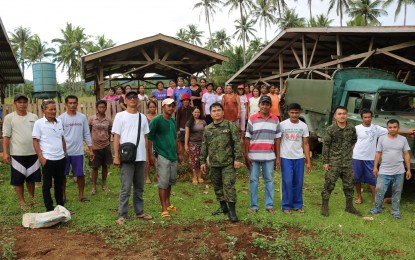
Village officials and military pose for a photo opportunity after the delivery of piglets in Villa Aurora in Burauen, Leyte. (Photo courtesy of the Philippine Army's 78th Infantry Batallion)
PALO, Leyte -- From being a rebel-infested and impoverished community, the upland village of Villa Aurora in Burauen, Leyte has gradually transformed to become this year’s top achiever in agribusiness in the province.
For village chief Winefredo Urtola, 63, their recognition as the best in compact integrated farming this year is a dream come true. Villa Aurora is a farming village 21 kilometers away from the town center and one of Burauen town’s remote communities.
“Back in 1980s, our village was a hotbed of communist rebels as many of our villagers joined the NPA. Two years ago, there was an attempt to recruit new members in a nearby community, but nobody from Villa Aurora bothered to listen to them because people have been busy with farming and all our children are in school,” Urtola told the Philippine News Agency (PNA) on Tuesday.
Urtola recalled how the 68-member organization worked hard to learn the art of raising high-value crops and livestock. Their total assets rose to about PHP5 million since they launched the project in December 2013, just a month after Super Typhoon Yolanda destroyed their main source of living -- coconut trees and abaca.
To start the business, each of the members contributed about PHP500 capital and PHP112 membership fee. The provincial government provided seedlings, fertilizers, piglets, and marketing assistance.
“When the governor noticed that we are diligent in producing high-value crops, the local government constructed five bridges and concreted the road leading to our village. Basic services and the market are now very accessible to us,” Urtola said.
Leyte Governor Leopoldo Dominico Petilla said the compact integrated farming was not really meant to fight insurgency, but primarily to raise the income of people in rural communities and arrest malnutrition among children.
“The root cause of insurgency is poverty and this program has been addressing poverty. I am happy that this has become one of the counter-insurgency measures in the province as we envision to making farming profitable for poor families,” Petilla added.
The compact farming program has already covered 210 villages in Leyte province this year.
Since the program’s launch in 2011, enrolled villages have experienced dramatic economic development from major improvements of infrastructure and an increase in food production.
The most successful is Villaconzoilo, an upland village seven kilometers away from the town center of Jaro, Leyte.
Aside from being the most impoverished area in the province in the past, the village was also affected by insurgency.
“The village has consistently achieved zero malnutrition rate and zero crime incidence over the past years,” the governor noted.
From producing high-value vegetables with a start-up capital of PHP1,800 from members’ contributions, the village evolved into a top farm-tourism destination in the province.
The organization managed to raise PHP20 million in assets with more than PHP4 million cash in the bank, and cultivates a 20-hectare farmland.
This is the second year the provincial government recognized farmers’ organization in Leyte. As winner, Villa Aurora farmers’ group received cash prize of PHP250,000 and a plaque of recognition.
This year’s runners-up are Macanip Integrated Farmers Association from Jaro, Leyte; Hipusngo Farmers and Fisherfolk Association from Baybay City; Sitio Sogod Farmers Association from Batbatngon, Leyte, and Canosa Ville Integrated Home-based Association from Palo, Leyte.
The event is the biggest gathering of farmers and fisherfolk from different towns in Leyte. Also recognized are 24 farmers’ associations, which passed the preliminary and final evaluations on their respective compact farming, hog fattening and breeding, egg laying, fisheries, community involvement projects, among others. (PNA)
